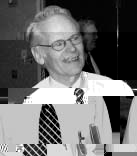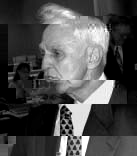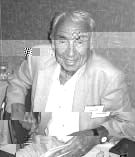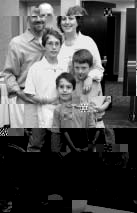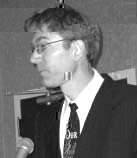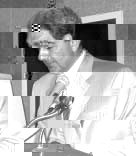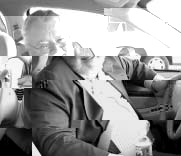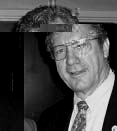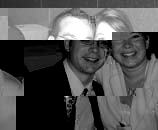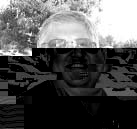|
|||||||||
|
|||||||||
|
Direct or by proxy? Meetings spanned Friday morning through Sunday early afternoon, May 14-16. The first presentation, not counting the opening remarks by Mr. Westby and Mr. Buzzard, was Jonathan Sjordal's. Mr. Sjordal, 38, along with his wife, Kristie, assisted Mr. Westby as the local host of the seminars. Mr. Sjordal's presentation, "The Principal and His Agents," focused on the practice of writers of Scripture to refer to some of God's "agents," or representatives, as if they were God Himself. Examples of agents are angels, prophets, priests, kings (including Cyrus) and even a donkey (Balaam's). But the most apropos example of this kind of agency, said the software engineer and leader of the Virginia Sabbath Assembly, is Jesus. "We know from the New Testament scriptures that Jesus--Hebrew Yahoshua--the Messiah, is our Savior," he said. Jesus' identity as Messiah and Savior "is fundamental to our faith." But, citing Isaiah 49:26, Mr. Sjordal also said that "we also know from the Old Testament that God is the Savior. A binitarian of the old Worldwide Church of God persuasion might object to Mr. Sjordal's statement here, pointing out that, of course, the God of the Old Testament is the Savior, because the God of the Old Testament was the Word, the member of the God family who at the time of His birth to Mary became Jesus Christ. So Mr. Sjordal also referred to Isaiah 63:16, which refers to YHWH, the God of the Old Testament, as "Father." Mr. Sjordal's point was that Jesus, the Son, can display many of the attributes of the Father--Christians can even properly bow to Him--without Jesus being very God. Monotheism or polytheism? Paul Haney's presentation, "Monotheism or Polytheism: Your Choice," divided the faithful of all religions into two broad categories: worshipers of one God and worshipers of more than one God. A problem with binitarianism, the director of Christ Fellowship Ministries said, is that its adherents worship more than one God; that is, two. Since binitarians believe in two God beings, Father and Son, Mr. Haney argued, then binitarians are not monotheists but polytheists: believers in more than one God. "Rather than just accepting the Old and New Testament standard of one God and work from that relatively simple and clear position, the Armstrong camp emerged, beginning with Herbert Armstrong [who founded the WCG], with a blurred picture of God and a convoluted system of polytheism," said Mr. Haney. He quoted what he called "contradictory" belief statements published by an unnamed split from the WCG. "'God is the eternal, all-present, all-powerful, supreme Creator,'" Mr. Haney read. "This first sentence would lead you to believe that God is one being. But it continues: "'God is one, composed of a spirit and comprising a family revealed as presently consisting of God the Father and Jesus Christ the Son.'"
The Bible talks Presenter Wayne Atchison's approach was to argue that the Bible talks about only one God. When people read in Scripture about two members of a God family or three members of a Godhead, they read something into the Old and New Testaments that is not there, he maintained. "Contrary to the ridicule of nearly all of accepted Christianity," the 53-year-old businessman, Church of God elder and Bible researcher said, "the belief that Yahweh is the only being that is God is fully supported by the original text of the Bible." Among other passages, he cited Acts 3:13-16, which has the Father raising Jesus from the dead, and 1 Corinthians 8:4-6, which seems to acknowledge the Father as "God" on one hand and Jesus as "Lord" on the other. The glory of God Art Mokarow, in his presentation, asked: What is the glory of God? The glory of God, as it turns out, was the Word of God, which, at the conception in Mary, became the Son of God; that is, Jesus. God's "glory," said 71-year-old Mr. Mokarow, a businessman, author of God's Puzzle Solved and former pastor, is analogous to the "Word" of John 1. Neither term, he said, refers to a literal "being," be he God or angel. Rather, God's glory, as is God's Word, he said, is personified in the being who came into literal existence at His conception in Mary. Notional crossroads New to the One God Seminars was Sean Finnegan, a theology student at Atlanta Bible College in Georgia who also holds a bachelor's degree in engineering. In his presentation, "Literal or Notional Preexistence?," the 24-year-old Mr. Finnegan, who was the only presenter lacking a WCG background, talked mainly about concepts implicit and explicit in the first chapter of John's Gospel. Yes, Mr. Finnegan said, the Bible teaches a "preexistence" of Jesus. But said preexistence is notional rather than literal. Just what do you mean notional, Mr. Finnegan? Notional preexistence is another way of talking about God's thoughts and the events leading up to Jesus' conception in Mary. Yes, Jesus (the Son, the Word) preexisted, but not literally. Mr. Finnegan noted and described three views concerning Jesus' literal preexistence or lack of it: the traditional, Arian and Socinian views.
Mr. Finnegan also talked about what he called the "problem" of a Jesus who, if fully God and fully man, would have "dual natures." Less than 100 percent When Mr. Westby stood behind the lectern to make his own presentation on the subject of the day, he first offered a disclaimer. "You don't have to agree [with me]," he said, "and your disagreement will not be regarded by me as evidence that you are not a Christian, nor are you ignorant or stupid. [Your disagreement means] only [that] we disagree." Still, he soon implied that agreeing with him is the sensible thing to do. For example, he said, "there are still some people walking around who think O.J. didn't do it." In offering his proof of Jesus' humanity and nondeity, Mr. Westby cited Jewish belief that the prophesied Messiah would be "a human man." "They [Jews] weren't expecting God or a man God or a spirit God to come down." But a view tinged by post-early-church Hellenism replaced the Jewish view of Messiah, Mr. Westby said. The concept of God-man fit nicely with Greek thought but was and is foreign to Scripture, which sees the nature of God through a Hebraic lens. Mr. Westby gave six "reasons to believe Jesus was always a man and is one today, albeit glorified and given eternal life":
Christ is deity Next David Antion walked to the lectern. Dr. Antion, who entered Ambassador College, Pasadena, as a freshman in 1956 and is married to the former Molly Hammer of Gladewater, Texas, accepted Mr. Westby's invitation to stand as the lone representative of the old Worldwide Church of God's Christology of choice, binitarianism. Binitarianism, a word that isn't to be found in Merriam-Webster dictionaries, is defined by theologians and historians as belief in a two-person Godhead. The belief in two discrete God beings, however, is considered more properly to be ditheism (also known as bitheism): the belief in two Gods. Some Church of God writers and preachers say they are comfortable with the "binitarian" designation, citing their belief in "one" God whom they describe as a "family." But others say they are quite at home with the concept of two Gods: Father and Son. Dr. Antion's presentation notably lacked either term, "binitarian" or "ditheistic." Rather, he worded his purpose as an argument for Jesus' "deity." He also stated emphatically that he believes in "one God." However, he proceeded to utter words that unitary monotheists would consider to be a non sequitur when he emphasized as well that he believes Jesus is "deity." Dr. Antion based his presentation in part on a recent 13-sermon series he delivered in Southern California that he will send as 13 audiotapes to anyone who requests them. (See the information at the end of this article.) Dr. Antion began his remarks by saying he was "very happy to be here in honor of . . . my Lord and my God," which he reminded his listeners were the words the apostle Thomas' exclaimed when he encountered the risen Jesus. Premise for deity Dr. Antion has spent considerable time studying the subject, he said, including his perusal of The Doctrine of the Trinity: Christianity's Self-Inflicted Wound, by Mr. Buzzard and Charles Hunting. As a result of his studies, Dr. Antion formulated a "premise" on which to base his arguments for Christ's deity. His premise is that the New Testament is "the inspired Word of God" and that it is "very, very reliable." When a Bible student reads the New Testament, he said, he can be much surer of meanings of words than when he is studying the Old Testament. "Hebrew is obscure," he said. "We don't know what it means, but we say we're going to guess this" or that. But "the New Testament, I believe, is very reliable." The New Testament is more than reliable, he said. It is "the essential revelation of things that are known about things that are not known without it." Therefore, he explained, as contrasted to the Old Testament, the New Testament is "essential revelation." Another premise A related premise, he said, is that revelation is "progressive." That is, as a Bible reader turns pages and moves from the Old Testament into the New, he encounters newer, better and more of the revealed information from God. He gave examples, comparing the synoptic Gospels with the Gospel of John. If we didn't have John's Gospel, we would not have the whole story of Jesus, Dr. Antion said. "John set some records straight that we wouldn't" otherwise know about, he said. For example, "we would not know of Jesus with the Samaritan woman at the well . . ." Don't neglect the New Dr. Antion criticized the other presenters at the One God Seminars for what he sees as neglect of the New Testament. "Sometimes the premise that I often see here is that we're going to go with the weight of Old Testament passages on this [one-God doctrine] against a few New Testament passages." Based on the principle of progressive revelation, Old Testament passages describing one God can indeed outnumber New Testament passages that indicate Jesus' deity, yet Jesus' deity can still be a fact. The later revelation of the New Testament outweighs the earlier revelation of the Old, he said. When in doubt, keep progressive revelation in mind. "I don't think you can just say if you've got a whole lot of Bible on this subject that that therefore means you've got to" believe in the strict monotheism advocated by the other One God Seminar presenters. Dr. Antion referred to an earlier statement by another presenter (Mr. Finnegan) that implied that to regard Jesus as God is "idolatry." Although "it's a very serious, grievous sin to have idolatry," Mr. Antion said, "it's also a pretty big sin to deny or lower or dishonor God's Son." Jewish thought Dr. Antion criticized what he perceived in the seminars as "a heavy emphasis on Jewish thought." He agreed with other presenters that it is helpful to "think like Jews," but "I want to think like the Jews who wrote the New Testament, primarily--and the Old Testament too, of course." He talked about the Shema, Deuteronomy 6:4, which strict monotheists like to quote: "Hear, O Israel: The Lord our God, the Lord is one!" Rather than understanding the Shema as a statement about the ontological number of God, Christians should read it as a warning against pagan Gods, said Dr. Antion. He expounded on the concept of the logos of John 1. Had God wanted to communicate the concept that the logos (translated "word") of John 1 was simply an idea or the "plan, purpose and intention" of God, He could have stated that concept unambiguously, said Dr. Antion. He also expounded on the Greek preposition en, sometimes translated "by." Colossians 1:16 states that "by" Jesus "all things were created that are in heaven and that are on earth . . . All things were created through Him and for Him." Dr. Antion cited other verses to show that the King James and New King James Bibles are accurate when they translate en as "by." If the heaven and earth were created "by" Jesus, then Jesus not only preexisted; He is also the Creator of heaven and earth. He talked about Philippians 2, which in the KJV has Jesus "emptying himself" of His divinity to become human. "When did He empty Himself, and what did He empty Himself of?" asked Dr. Antion. ". . . You can say He's divested Himself of things He could have had, but why would He need to do that?" Dr. Antion said too many plain scriptures have to be disregarded to make Jesus out not to be "deity." He acknowledged difficult Scriptures that cloud the issue, and he acknowledged that to believe Jesus is deity requires acceptance that some aspects of God must remain "mysteries." "I am willing to live with the mysteries," he said. Dr. Antion declared that if it is "wrong" to believe that Jesus exists as deity," then when Jesus returns "He should call Matthew, Mark, Luke, John and Paul and grab them and pull them over and say, 'You boneheads, you boneheads, you didn't put in a caveat . . . These gentiles are going to read this and be misled into idolatry. I'm going to defrock John first thing.' "That's what should happen if I'm wrong, and I think that's what Jesus will do." Questions and answers In a question-and-answer session immediately after Dr. Antion's presentation, Gary Fakhoury, who would formally speak later in the conference, questioned Dr. Antion. "I listened to your entire tape series and I still don't know the answer to two basic questions," Mr. Fakhoury began. "Was Jesus the incarnation of Yahweh, and how many God beings are there?" "I do not know whether Jesus was the incarnation of Yahweh," said Dr. Antion, "because I don't think the New Testament says that. However, there are many, many, many New Testament passages that transfer statements about Yahweh to Jesus." Mr. Fakhoury: "So what do you conclude?" Dr. Antion: "I conclude this, that the New Testament writers must have thought that statements about Yahweh were good enough to transfer to the risen Christ." The risen Christ, said Dr. Antion, is "different" from the human Jesus. He is "the glorified Christ, the one that appears in the book of Revelation, whose hair is white as snow and [who emits] flames of fire. I don't know all the mysteries, no." Mr. Fakhoury: "How many God beings are there?" Dr. Antion: "Well, I don't know. If you say God is the Father's first name, then there's only one God being. If you say God is the last name, I don't know. I think Jesus is deity. I think Jesus is equal with God." Mr. Fakhoury: "Was He eternally uncreated?" Dr. Antion: "Yeah, I believe that, because it says 'in the beginning.'" Mr. Fakhoury: "So there are two eternal God beings, then?" Dr. Antion: "I don't know. That's your conclusion. I did not say that. You're asking the questions that I think get people off track. When John wrote that, he didn't say two God beings. He said in the beginning the logos was God and the logos was not God. "I don't propose to make statements like that, because they are mysteries to me . . . I believe in one God, the Father, and the Lord." If a Bible reader determines to "get real strict" with the word one and therefore cannot call Jesus God, then "you can't call the Father Lord," said Mr. Antion. ". . . You can't be strict on one thing, then loose on the other." Difficult definition He commented on the difficulty of defining "God." "Any definition in human terms of human words reduces God," he said, "and I'm just not willing to do that. I'm not willing to make an enormous definition of God. He is all and in all. He is beyond my ability to understand and even to comprehend Him completely except that Jesus said He is our Father, and I accept that He is tender and kind and loving." Mr. Buzzard, from the audience, thanked Dr. Antion for his "determined and spirited presentation." "You seem to speak often as a unitarian," Mr. Buzzard said. "You speak of God and you mean the Father, clearly. On the other hand, you come up with the Word as a second divine being." Mr. Westby, back at the lectern, ended the Q&A and introduced the next presenter, Mr. Buzzard. Paying John and Paul Mr. Buzzard, 68, was born to Sir Anthony and Lady Margaret Buzzard in England in 1936. His father served as an admiral in the British Navy. His grandfather, Sir Farquhar Buzzard, had been awarded a baronetcy (one level up from a knighthood) in 1929 after serving as personal physician to two kings of England, George V and VI. Mr. Buzzard attended Ambassador College in Bricket Wood, England, for five years and looks back on his Radio/Worldwide Church of God and AC experience as "exhausting." "I was a frail sort of sensitive person, and I couldn't deal with it . . . I left in a state of exhaustion and went to work as a music teacher for a while." Mr. Buzzard first left what he calls the "Armstrong movement" in 1965 and returned to the Worldwide Church of God in 1968. He left it permanently in 1973.
Present membership Mr. Buzzard, who serves on the faculty at Atlanta Bible College, Morrow, Ga., is a member of the Church of God Abrahamic Faith, which is not a Sabbath-keeping group. Most of the presenters are Sabbatarians. However, Mr. Buzzard and Mr. Hunting (a former deputy chancellor of AC, Bricket Wood) are not, and neither is Mr. Finnegan, a student at Atlanta Bible College. Mr. Buzzard's address was "Robbing Matthew and Luke to Pay John and Paul" and was largely a response to Dr. Antion's presentation. In fact, Sir Anthony departed somewhat from his prepared text, which was originally titled "Defining God in the Bible." "One of the great flaws in exegesis," he said, "is that we must not cut the Old Testament off, but I agree with Dr. Antion that we must not make the opposite error of cutting off the New Testament . . . "On the other hand, we must allow Paul to say things . . . that were not known in the times of old." Sir Anthony said he agrees with "progressive revelation" as defined by Dr. Antion. He expounded on what he sees as the biggest problem with "Armstrongites," which is what he calls many members and former members of the Worldwide Church of God. "The tendency of Armstrongites, and I'm speaking as an ex," he said, "is to live on an island with theology dropping out of the sky at you." If a Bible student wants to learn about the Bible, God and Jesus, he said, then he must not reflexively reject the works of respected Bible scholars simply because they are not and never were Armstrongites. Concerning binitarianism, the concept that the Father and the Son are one God, he said: "If we say the Father is God and the Son is God and that's one God, we're not saying anything that conveys any meaning." Concerning Thomas's encounter with the resurrected Jesus, Sir Anthony said that, even though the Bible sometimes has people speaking with angels and addressing them as "God" (as in the account of Jacob's encounter with the one with whom he wrestled), "you can talk to an angel and say 'God,' but you don't mean [the angel is] God." Therefore one should not assume that Thomas was making a theological pronouncement when he exclaimed "God" when seeing the risen Christ for the first time (John 20:28). Mr. Buzzard progressed to his main point in response to Dr. Antion's presentation: that God, by definition, cannot die. He paraphrased Methodist hymn writer Charles Wesley: "It's nonsense to say the immortal dies. Otherwise words have no meaning and you wipe out the Scripture as a testimony to anything." Since, by definition, God cannot die, argued Sir Anthony, then Jesus cannot be God because Jesus did die. Christology of Hebrews Gary Fakhoury, 42-year-old owner of an advertising business and graduate in the 1980s of Ambassador College, began by declaring that the letter to the Hebrews "contains the most Christological information of any other New Testament book." At the beginning, he said, Hebrews mentions in its first two verses that God spoke anciently through the prophets but "in these last days" by His Son. The wording shows a contrast between God on the one hand and the prophets and God's Son on the other. "The only conclusion we can reach from this information," said Mr. Fakhoury, "is that Yahveh is not Jesus and Jesus is not Yahveh." If Jesus were God, he said, then the verse would undoubtedly read: "Yahveh spoke through the prophets to their Hebrew fathers, but in these last days He speaks to us personally as Jesus." Thus, he said, at the very beginning of the epistle the entire issue of Yahveh's identity and Jesus' identity is settled. "To the writer of Hebrews, Jesus is not the God of the Old Testament. His Father is." Mr. Fakhoury expounded on and drew analogies about the Word and the wisdom of God. Most Bible students recognize "wisdom" is a personification and not a person. Likewise they should recognize that "word" (as in Word of God) is a personification and not a person. Four themes Mr. Fakhoury listed four "Christological themes" of Hebrews:
"What is a priest?" asked Mr. Fakhoury. "What is his purpose and function?" Since the duty of a priest is to stand as a mediator between God and men, Jesus cannot be God, he said. Have scriptural backing Charles Hunting, at 85 living in retirement in Florida, in his presentation said that his biggest concern is that in "any activity that we have" there be "scriptural backing for it." As a help to Bible study, he recommended his and Mr. Buzzard's book The Doctrine of the Trinity: Christianity's Self-Inflicted Wound. For people attending the seminars, copies of the book were available free of charge. (It sells for $25.95 at Amazon.com.) "I cannot be shaken by eternal concepts and ideas of people who have never had access to the scholarship that some of us have fortunately been able to be a part of," Mr. Hunting said. He commented that during his days in the Worldwide Church of God "we were taught . . . that scholars were four-eyed, pin-whiskered fools, and I believed that. I believed that we had the truth, that we were the one and only true church, we had the end-time apostle; he was third in the universe; he was Elijah." He said he began to "suspect some things were not true" because he "traveled with Elijah." Mr. Hunting stated that not until the second century after the birth of Jesus did the "binary" concept of God come to exist. In conclusion In the seminars' concluding comments, Mr. Westby answered a criticism that he said some have leveled at unitary monotheists. "They suggest that we attempt to demote Christ." But "I assure you, I assure anybody listening to these tapes [which were being recorded during the sessions], we are not doing that . . . In that [in not demoting Jesus] I don't see that much difference in our view from binitarians' and even from Trinitarians'." Contact the presenters Mr. Westby provided contact information for the presenters and their ministries.
Write him also about the ACD's new Feast of Tabernacles site scheduled for this year near Helena, Mont. |
Church Links - Addresses - Church Logos - Finances - Photos - Memorial
The Study Library - In Transition - Messages Online - Live Services
Back Issues - Subscribe - Email List - Ad Rates - Site Map
© The Journal: News of the Churches of God
